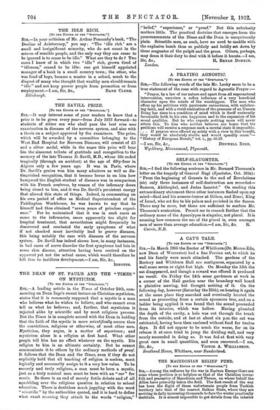THE DEAN OF ST. PAUL'S AND THE " TIMES "
ON MYSTICISM.
[To THE EDITOR OF THIS " SPEOTATOR.41
SIR,—A leading article in the Times of October 24th, com- menting on Dean Inge's recent lecture on Christian mysticism, states that it is commonly supposed that a mystic is a man who believes what he wishes to believe, and who cannot even tell us what he believes ; and, further, that mysticism is rejected alike by scientific and by most religious persons. But the Times is in complete accord with the Dean in holding that the faith of the mystic is more scientifically secure than the convictions, religions or otherwise, of most other men. Mysticism, they argue, is a Matter of experience ; and mysticism alone is a religion at first hand. What other people tell him has no effect whatever on the mystic. His religion. to him is an ultimate certainty. But he cannot communicate it to others by the ordinary methods of proof. It follows that the Dean and the Times, even if they do not explicitly hold that all teaching of religion is useless, must logically and necessarily assign to it a very low value. To be securely and truly religious, a man must be born a mystic, just as a truly musical man must be born with an " ear " for music. So there is an end of merely futile debate and of all squabbling over the religious question in relation to school education. There is doubtless much juggling with the word " scientific " by the authorities quoted, and it is hard to define what exact meaning they attach to the words "religion,"
." belief," "experience," or "proof." But this nebulosity matters little. The practical doctrine that emerges from the pronouncements of -the Times and the Dean is unequivocally plain. Scientific men, as such, have no need to meddle with the explosive bomb thus so publicly and boldly set down by these magnates of the pulpit and the press. Others, perhaps, may deem it their duty to deal with it before it bursts.—I am,


























































 Previous page
Previous page